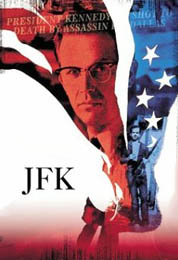Back, and to the Left

Continuing my look at the major films of 1991, I now turn to JFK, directed by Oliver Stone. I saw it on its opening day, a few days before Christmas, at the Paramount Theater in Columbus Circle. I remember the marketing people handing out pieces of paper and little pencils to ask us what we thought of the film. Fifteen years later, I’m still not sure.
The assassination of John Kennedy is the great American mystery. A forest has been sacrificed to make all the paper for all the books and articles that have been written about it (26 volumes of the Warren Report alone). And still we are no closer to a definitive answer than we were 43 years ago. It certainly is a great subject for a film, but I think Stone makes a few key errors.
One is to make Kennedy too saintly. As years have gone by, the more we learn about him the more his legacy was tarnished. He and his father certainly cozied up to the mob, and there is good evidence that the election of 1960 was crooked (to be fair, there were phony votes for Nixon as well). His sexual proclivities make Bill Clinton look like a Boy Scout, and while that is a failure of character that doesn’t necessarily translate into an ineffective leader, it does when you share a mistress with a major Mafia figure. Secondly, Stone’s entire premise for the motive in killing JFK is his belief that Kennedy would have pulled out of Vietnam, had he lived. This is disputable. Kennedy was a hard-line cold warrior when elected. And, given all the philandering he did, wouldn’t have been easier to blackmail him, rather than kill him in a conspiracy that must have been known by hundreds of people? Finally, that Stone made Jim Garrison the hero of his film makes it a little shaky. Garrison, many believed, was a zealot and not playing with a full deck. Stone works around this by having Garrison’s character tell us that people are making him look crazy.
I vacillate on what I believe. There are a couple of problems with the lone gunman theory—namely the magic bullet, and that Oswald couldn’t have possibly fired off that many shots with a crummy rifle in such a short period of time. Also, it is well established that Jack Ruby, who offed Oswald, was mobbed up. I did read a book about ten years ago called Case Closed, by Gerald Posner, who answers all these questions and maintains Oswald acted alone. I don’t remember the particulars, but the book was very convincing.
But what of the film? On the extras disc, New York Times report Tom Wicker sums it up best, I think, when he says it is certainly well put together, but he doesn’t consider it art, it is propaganda. Stone has fish to fry and the film is constructed toward that end. It is frequently very stirring, at times irritating. The domestic scenes between Kevin Costner and Sissy Spacek are especially clumsy, and recall the funny scene in Annie Hall when Woody Allen gets dumped by Carol Kane because of his obsession with the assassination. But I will admit that the twenty or so minute scene toward the end, when Costner makes his speech to the jury and lays out the entire theory, is quite breathtaking.
One amusing footnote: the TV show Seinfeld did a great parody of the film when Kramer and Newman tell their story of being spit on by baseball player Keith Hernandez, and Jerry presents his theory of the “second spitter.” What I hadn’t realized was that Wayne Knight, who plays Newman, was in JFK as one of Costner’s assistants, and is one of the dummy figures in the “magic bullet” demonstration, just as he is on Seinfeld (except in this instance it is the “magic loogie”).


Comments
Post a Comment